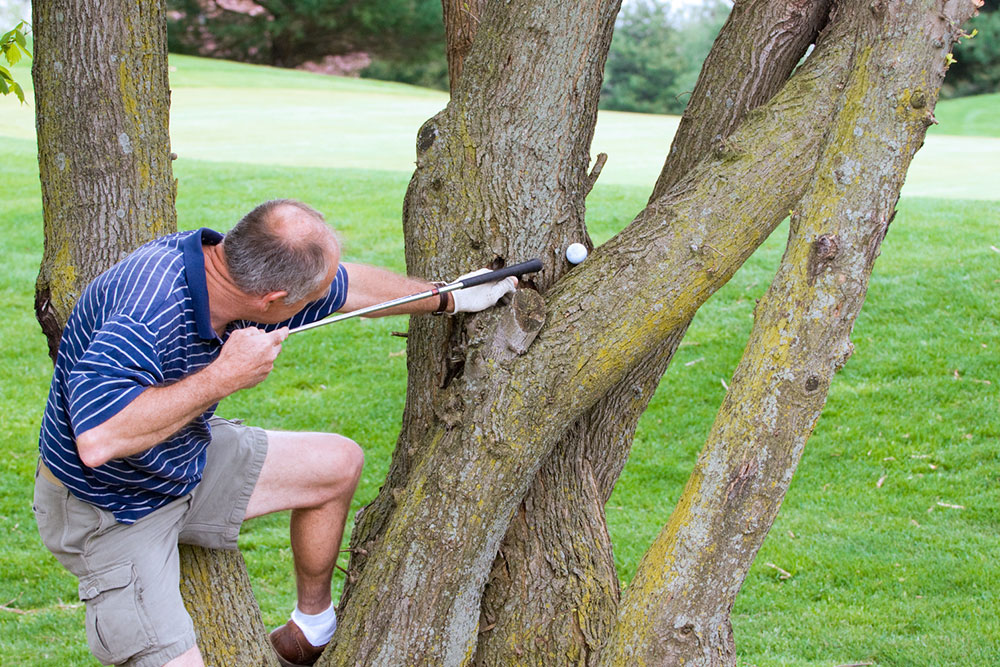12 mistakes beginner golfers must avoid

As golf gains popularity, many people, young and old, are picking up clubs and heading to the drive. Since golf is immensely technical, it can be difficult to master. It takes a lot of time, patience, and practice to become a pro. Like in any other sport, beginners are bound to make mistakes. Since some of these can prove costlier than others, it is also important to learn how to sidestep them.
Here are 12 common golfing mistakes beginners make and how to avoid them:
1. Using the wrong clubs
Golf happens to be one of those sports where one can share the blame with the equipment. One of the biggest mistakes beginners make when playing golf is choosing the wrong club. Ideally, it is best to opt for a custom-fitted club for one’s swing. Since novices aren’t likely to invest in custom clubs when they are just starting out, this can be a bit of a hassle.
2. Swinging too hard
Swinging too hard does not always equate to a longer shot. Instead of focusing on strength, one should work on finding the right tempo and rhythm.
3. Using the wrong grip
While golf may look simple, there is a lot of finesse to the sport. There are three types of grips to choose from – overlapping, interlocking, and baseball style. While there is no right or wrong way to grip a club, one needs to experiment to learn what works for them.
4. Gripping the club too tightly
Many novice problems can be traced back to one’s grip on the club. Holding it too lightly can cause issues with one’s swing while holding it too tightly can make it difficult to complete a full shoulder turn. This can impact power and fluidity. One must work on developing a secure grip without making it too difficult to move.
5. Poor alignment
No matter one’s level of expertise, it is important to keep a check on the basics. Alignment is one of the most crucial aspects of getting a shot right. If the alignment isn’t correct, one may not be aiming at their intended target. Get the basics right to set off on the path to mastering the sport.
6. Lack of practice
While heading out to the range to practice one’s swing shots may sound like a great idea, it is important to practice with purpose. Practicing alone by hitting the ball aimlessly may not shed light on bad form, grip, or alignment. Instead, one runs the risk of cementing their bad form.
7. Avoiding lessons
To ensure one has the right form and movement, opting for lessons or classes can help. Seek lessons from a qualified PGA professional. They can help make minor corrections and adjustments to one’s form, which can drastically improve one’s game. If this option feels out-of-reach, one can ask an experienced friend to help, join a club that offers group training sessions, or learn from training videos online.
8. Teeing the ball too high
Beginners often believe that teeing the ball as high as possible on the peg will increase their chances of an airborne shot. This is simply not true. Teeing the ball too high can make it difficult to find the center of the clubface, causing poor contact between the club and the ball.
9. Neglecting warm-up
While golf isn’t a fast-paced sport like football or basketball, it is still physically taxing. Skipping warm-up before swinging the club can increase the risk of injuries and muscle pulls. It is important to always do a quick pre-game warm-up before starting. This could be as simple as doing a few gentle practice swings before teeing up.
10. Not playing from the right tees
While being competitive can work wonders for honing one’s skills, it is also important to be responsible. Depending on one’s experience, it is best to play in the same tee or a tee that’s a box up from one’s friends. This way, one can ensure the game’s pace is maintained and that everyone has a fun time.
11. Giving up too soon
Since the sport tends to look so simple on television, everyone assumes they are likely to get by without any struggle. But it is important to remember that beginnings are always messy. Like any other sport, golf requires intense dedication and practice. So don’t hang those clubs up too soon. Take some lessons, be willing to learn, and keep practicing to hone those golfing skills.
12. Ignoring basic etiquette
As a sport, golf has its own rules of etiquette. While some of this has been formally established, there are also many unwritten rules to remember. Some basics that beginners should always practice are:
- Be silent when other players shoot.
- Rake the bunkers, fix the ball marks, and replace the divots before moving on to the next shot.
- The player furthest from the hole plays first.
- Follow the dress code.
- Maintain the flow of the game. Avoid any distractions.
- Do not step on someone else’s putting line.
- Mark the ball if it is in someone else’s putting line.
- Let other golfers pass if they are moving faster.
- Walk at a reasonable pace to the ball and between holes to avoid slow play.
- Do not take more than 30-45 seconds to make the shot.